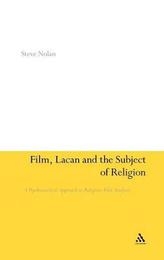
|
Film, Lacan and the Subject of Religion: A Psychoanalytic Approach to Religious Film Analysis
Hardback
Main Details
| Title |
Film, Lacan and the Subject of Religion: A Psychoanalytic Approach to Religious Film Analysis
|
| Authors and Contributors |
By (author) Revd Dr Steve Nolan
|
| Physical Properties |
| Format:Hardback | | Pages:232 | | Dimensions(mm): Height 234,Width 156 |
|
| Category/Genre | Film theory and criticism
Religion - general |
|---|
| ISBN/Barcode |
9780826427601
|
| Classifications | Dewey:205.65 |
|---|
| Audience | | Professional & Vocational | |
|---|
|
Publishing Details |
| Publisher |
Bloomsbury Publishing PLC
|
| Imprint |
Continuum International Publishing Group Ltd.
|
| Publication Date |
23 July 2009 |
| Publication Country |
United Kingdom
|
Description
In their study of religion and film, religious film analysts have tended to privilege religion. Uniquely, this study treats the two disciplines as genuine equals, by regarding both liturgy and film as representational media. Steve Nolan argues that, in each case, subjects identify with a represented 'other' which joins them into a narrative where they become participants in an ideological 'reality'. Finding many current approaches to religious film analysis lacking, Film, Lacan and the Subject of Religion explores the film theory other writers ignore, particularly that mix of psychoanalysis, Marxism and semiotics - often termed Screen theory - that attempts to understand how cinematic representation shapes spectator identity. Using translations and commentary on Lacan not originally available to Screen theorists, Nolan returns to Lacan's contribution to psychoanalytic film theory and offers a sustained application to religious practice, examining several 'priest films' and real-life case study to expose the way liturgical representation shapes religious identity. Film, Lacan and the Subject of Religion proposes an interpretive strategy by which religious film analysts can develop the kind of analysis that engages with and critiques both cultural and religious practice.
Author Biography
Steve Nolan is Chaplain at Princess Alice Hospice, Esher, and Tutor in the Faculty of Religion and Theological Studies, Cardiff University, UK.
Reviews"In this engrossing and provocative study, Steve Nolan explores the insights which film theory has to offer to the study of religion and film. Rather than focusing on theological meanings or religious narratives within the film, Nolan argues that it is in the effects on the spectator that we discover the analogy between liturgy and cinema. Engaging closely with the theoretical perspectives of the journal Screen and with Lacanian psychoanalysis, Nolan opens up exciting new possibilities for approaching the liturgy as a form of participative representation, analogous to film, and the implications of this for the construction of religious identities, the transmission of religious ideology, and the role of the priest in the liturgical performance." - Professor Tina Beattie, Roehampton University, UK "Steve Nolan's book is a genuinely creative advance in the study of religion and film, establishing a new sense of their relationship through an understanding of film as liturgical experience, and thus suggesting a highly original answer to the question, "What can film theory offer liturgy?" It is a challenging read in its powerful theoretical grounding of the experience of cinema in Lacanian theory of dreams, but the rewards are considerable in the series of brilliant readings of the role of priests in individual films from Bing Crosby's Father Chuck O'Malley in the 1945 The Bells of St. Mary's to Jeremy Irons in The Mission and Henry Fonda in The Fugitive. This book takes the study of film and religion onto a new level of critical and theological sophistication, challenging alike to film theory and to theology and liturgical studies." - Professor David Jasper, University of Glasgow, UK "This is an original and thought-provoking book. Nolan provides an intelligent, nuanced and critical invitation to consider what the insights of Lacanian pyschoanalysis, 'Screen film theory' and liturgical participation can contribute to the study of both film and religion. Hollywood hits, such as Air Force One, and more controversial productions, such as The Siege, are put to creative use to illustrate his sophisticated argument. Drawing on a wide range of other films and theorists, Film, Lacan and the Subject of Religion is a significant and stretching contribution to the rapidly evolving area of study related to film, religion and theology." - Dr Jolyon Mitchell, University of Edinburgh, UK Given its technical vocabulary and its theoretical emphases, this volume will likely appeal to a somewhat exclusive audience, but in light of the increasing interest in religion and the movies, Nolan's account stands to become an important contribution to the discourse, offering a highly suggestive comparison of the moviegoer and the subject of religion. -- Jeremy Biles * Religious Studies Review *
|